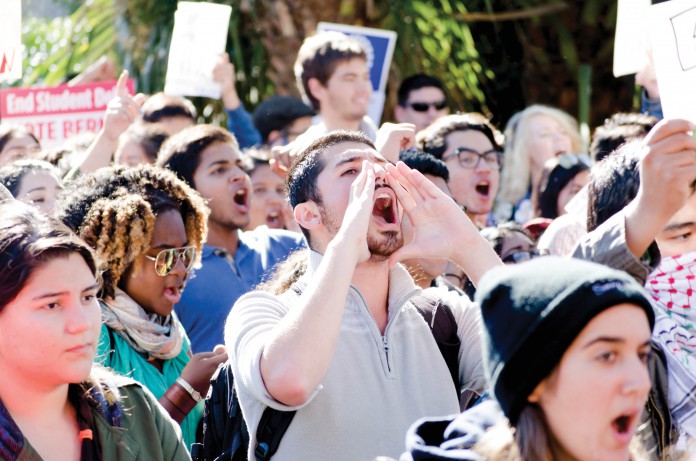
Madeleine Lee
Campus Beat Reporter
With the end of a two year tuition freeze looming over the heads of many continuing students, University of California, Santa Barbara students plan to mobilize with a campus-wide walkout, to be held at noon on Monday, Nov. 21.
The Santa Barbara Student Activist Network, with funding from the Office of the External Vice President of Student Affairs, will lead students in a march on the Monday of Thanksgiving week as part of a UC system-wide day of action. Students on all campuses are planning to vocalize concerns that the UC-wide tuition freeze, announced in May 2015 and set to end with the beginning of the 2017 fall quarter, didn’t fully address.
“The biggest issue is we don’t want a repeat of what happened two years ago,” said fourth year religious studies major Eric Villalobos, one of SBSAN’s lead organizers.
Though the two year tuition freeze was a relief to many, the temporary tuition stand-still that was brokered as part of a deal between Governor Jerry Brown and UC President Janet Napolitano only granted immunity to undergraduate in-state students. During the two year period, graduate and out-of-state students were still subject to tuition increases. Since the 2014-2015 school year, tuition for out-of-state students has increased by nearly $4,000, according to cost charts on the UC Admission and UC San Diego websites.
“There are still problems,” said Villalobos. “There is still the issue that the freeze wasn’t for everyone, even though the tuition hikes were for everyone. Second, it doesn’t solve the structural problems of how the UC is funded.”
Set to follow the same route as last year’s Million Student March, protesters will begin the march at Storke Plaza, move through the Arbor to North Hall, and then end at Cheadle Hall. Their demands, according to the official Facebook event page, include not just a tuition freeze, but a tuition rollback.
Before the march, organizers, which include members from student organizations like VOCEROS, United Students Against Sweatshops, and the Muslim Student Association, are in the process of contacting professors to encourage students to join the walk out. Two teach-ins will also be held to inform students on the facts behind the 2015 tuition freeze.
The freeze itself came at a high cost to local taxpayers, with the state shelling out almost $1 billion in funds to the UC system over the four year period between 2015 and 2019. As part of the agreement with Brown, Napolitano increased the number of online classes offered, allowing students the opportunity to graduate faster and alleviating the economic burden on both students and the UC system.
At a meeting in February, California State University governing board members proposed that future tuition hikes be tied to inflation, an annual fee that would be significantly smaller than the five percent annual increase proposed prior to the freeze, according to The Sacramento Bee.
Had the freeze not been approved, annual tuition hikes from the beginning of the 2015 academic school year to the end of 2019’s would have amounted to a 28 percent tuition hike, according to SFGate.










